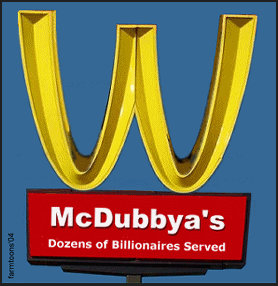Wednesday, July 21, 2004
Two Americas
 Businesspeople, at least so far as their businesses are concerned, can't completely lie to themselves; if they're utterly divorced from reality, the business goes under. (Here contrast the Republican party.) So papers like the Wall Street Journal come as close to the truth as the people who run the country can bear. So the fact that this was the lead story yesterday is interesting:
Businesspeople, at least so far as their businesses are concerned, can't completely lie to themselves; if they're utterly divorced from reality, the business goes under. (Here contrast the Republican party.) So papers like the Wall Street Journal come as close to the truth as the people who run the country can bear. So the fact that this was the lead story yesterday is interesting:
So far, economic recovery tilts to highest-income Americans
Upper income families, who pay the most in taxes and reaped the largest gains from the tax cuts Bush championed, drove a surge of consumer spending a year ago that helpled rev up the recovery. Wealthier households also have been big beneficiaries of the stronger stock market, higher corporate profits, bigger dividend payments and the boom in housing.
Lower- and middle-income households have benefited from some of these trends, but not nearly so much. For them, paychecks and day-to-day living expenses have a much bigger effect. Many have been squeezedm with wages under pressure and with gasoline and food prices higher. The resulting two-tier recovery is showing up in vivid detail in the way Americans are spending money.
Hotel revenue was up 11% in the first five months of 2004 at luxury and upscale chains, but up just 3% at economy chains. [The luxury Italian company Bulgari's] US revenue was up 22% in the first quarter. Neiman-Marcus...had a 13.5% year-over-year sales rise at stores open at least a year. By contrast, such "same store" sales at Wal-mart were up just 2.2% in June.
"To date, the [recovery's] primary beneficiaries have been upper-income households," concludes Dean Maki, a JP Morgan (and former Federal Reserve) economist.
Weekly earnings, adjusted for inflation, were down 2.6% in June from a year ago. The slip might be transitory, but it was the largest decline since 1991.
Are you better off than you were four years ago?
